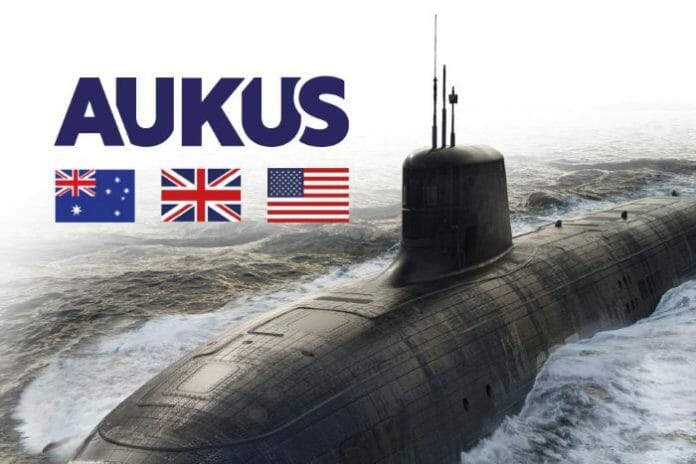The landmark pact of AUKUS made official with a detailed unveiling this week underscores concerns over China’s growing military power in the Indo-Pacific region, and it remains a natural and expected response to a rising power that is deemed to be consistently following a bellicose path that threatens the foundation of the rules-based order.
The US, Australia, and Britain unveiled details of a plan to provide Australia with nuclear-powered attack submarines from the early next decade to counter China’s growing threat in the Indo-Pacific.
Efforts by the West to court greater responses and measures that can stand up to Beijing’s power manovures have been largely futile, as these regional players are too deeply embedded under Beijing’s orbit and economic grip to risk their future economic survivability and the ensuing internal political survival.
Seeing the subdued response by these players in lacking the seriousness of shoring up their own capacities and defences, the West is left with no choice but to stem the tide early on. Having learned from past Cold War experiences and needing to protect the first line of defence, realistic measures of deterrence and containment are the natural responses.
This is reflected in Canberra’s truthful, open, and honest acknowledgment of the threat it faces, and is mirrored in the needed actions that will assure its long-term security and survival. It remains pragmatic and highly realistic on its current vulnerability and has also made clear its intent to continue working with Beijing in an open, transparent, and engaging manner that will further foster diplomatic and meaningful long-term fruitful relationships based on mutual trust and respect. At the very least, it is mindful of its security needs and is doing the right thing, albeit the potential repercussions.
Australia and New Zealand remain the first line of Western presence and containment in the region, and they both cannot afford to fall under Beijing’s measures or power threats in the deja vu domino effect. Both of them remain the face and frontline of the West. Expectations on ASEAN and regional conflict prevention mechanisms with various deterrence and confidence-building measures have failed to lower the tone and depth of Beijing’s hard power actions and coercive efforts in the region that have fuelled regional fear and deepened regional trap.
Only a few players directly at the forefront of future crises and conflicts, especially Manila and existing Western allies including Tokyo and Seoul have charted a far more strategic, urgent, and holistic early measures and deterrence approach through their various joint defence tie-ups and reciprocal access agreements which have also attracted other players that acknowledge the realistic setup and trends on the ground.
For Malaysia, we have been unwilling to take bold, gigantic, decisive, and long-term security and hard power deterrence moves like AUKUS, fearing negative implications which we argue will backfire on our own security calculations. Consequently, we rely on a mixture of gradual defensive improvements without inciting risky reactions and fears, especially from Beijing, and giving no pretexts for it to justify further escalatory tension. By relying on this gradual and seemingly “harmless” build-up of defensive measures including LCS, radar improvement, and the periodical purchase of assets including the FA-50 Korean jets and others, we hope that these will be enough to safeguard our defensive needs all while at the same time reduce retaliatory justifications from Beijing and other powers.
By doing so and adhering to our neutrality, we hope to play our regional leadership power by steering clear of the Sino-US conflict by giving no reasons for us to be sucked into the spiral of the endless security dilemma and the arms race, through rebuking escalatory moves especially AUKUS in accusing it of worsening risks of regional nuclear proliferation.
Despite all the rhetoric and foreign policy limitations, the reality remains that the urgency of time is not on any regional country’s side and that the fastest, most cost-effective, and most impactful deterrence and defensive measure will be to shift our defence and foreign policy alignment to bandwagon with the greater Western security counterbalance capacity. Just by moving closer to welcoming these needed Western security assurances, either through opening up more access points and bases or integrating clearer intention to host assets and personnel in strategic locations, among many others, will be the safest and surest bet to gigantically secure our security and deterrence capacity against any future potential incursions or threat.
It will save us millions if not billions of dollars in the long and costly process of revamping our security and defensive overhaul, and also saving us crucial time and urgency. Alas, our own trap and pandering will seemingly make this impossible, at our future expense, while other regional players have been steps ahead in their strategic calculations and wise projections of navigating through these turbulent times with great urgency. We remain blinded in our ignorance and trapped in our perceived “consistent and influential” foreign and defence policy orientation that has “stood the test of time over decades” that we have been so proudly trying to preserve, despite the obvious changes and realities on the ground.
AUKUS is a natural inescapable reality born out of primarily Canberra’s open fear and acknowledgment of its vulnerability and being virtually a sitting duck against the might of Beijing’s long arm of hard power capacities. Canberra’s capability to take this route is also pillared by its Western identity and support, but other non-Western players in the region are not limited by this advantage as they too, receive huge openings for Western security assurances but remained tied by their conventional policy option and regional norms.
Regional hypocrisy is also at play, where condemnations and fears have been swift, in accusing the West of fearmongering and stoking regional arms race and nuclear annihilation, but remaining silent and subdued on the escalating nuclear ambition by Beijing in the region through its nuclear SSBN/SLBM capacities in the South China Sea and beyond. Quietly, many regional players are welcoming the greater Western security presence and deterrence, including AUKUS, as a needed tacit message and deterrence against Beijing’s onslaught and intimidation, but choosing to sing a different tune publicly to conform to their established individual and regional foreign policy orientation and to avoid inviting Beijing’s wrath.
Contrary to claims and rapid condemnations and fears, AUKUS does not pose an immediate or future threat to regional security calculations, and it remains the regional saviour for a more balanced, open, transparent, and strategic power balancer that can deter any bilateral pursuit to alter regional power parity or to reinforce Beijing’s regional hegemonic intention. The nature of AUKUS and the ready willingness to brief other nations on the details and purpose of this signals the openness to engage and to be fully direct and realistic on the manoeuvre, unlike other powers.
AUKUS remains a symbol of a great message to Beijing and regional players for now as a powerful deterrence and readiness to step up, and it remains a crucially needed counterbalancing measure that will bring assurances and increasing guarantee that the West’s pivot and readiness to maintain its Indo Pacific presence are here to stay. Whether individually as a country or the region collectively, we remain sitting ducks to any external threats that are far-lethal and enduring in nature, with no matching capacities to provide deterrence, let alone second-strike capacities.
The presence of AUKUS provides a temporary stop-gap measure, and the least that the doubters and the anti-West players in the region can expect is that the Western powers that are backing this, especially the US, are the ones who have created the rules-based order in the first place, and strived to preserve it for common global peace, freedom, and prosperity. AUKUS is thus meant to secure and preserve the decades-old rules-based system and the foundation of peace and freedom, not the opposite path of creating conflicts, chaos, and destruction.
By COLLINS CHONG YEW KEAT
The views expressed here are the author’s own and do not necessarily representative of those of the publisher.









